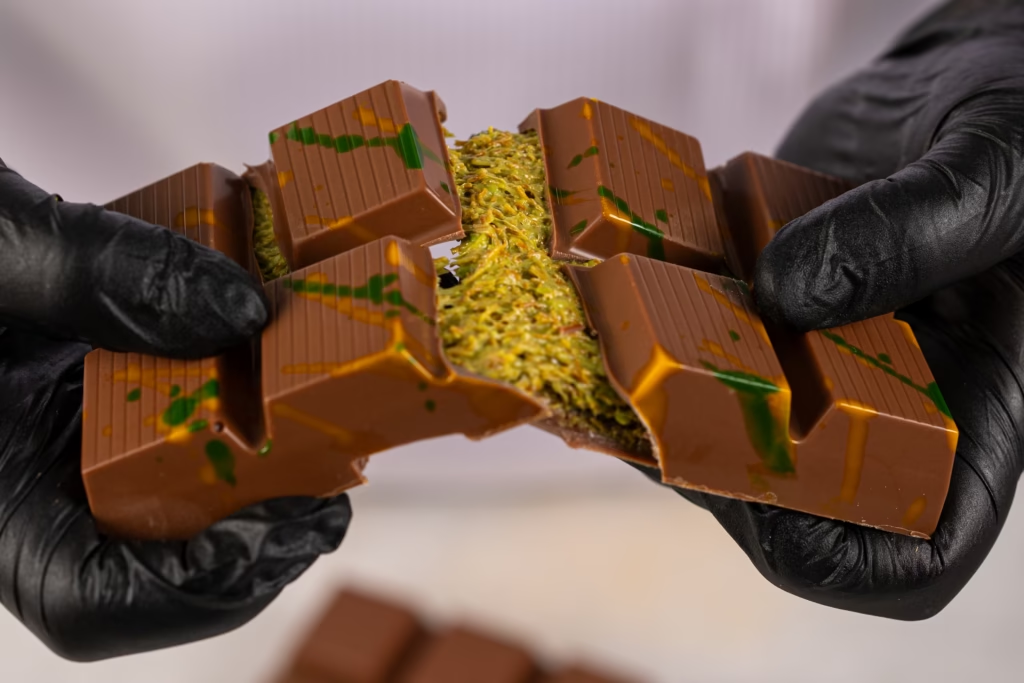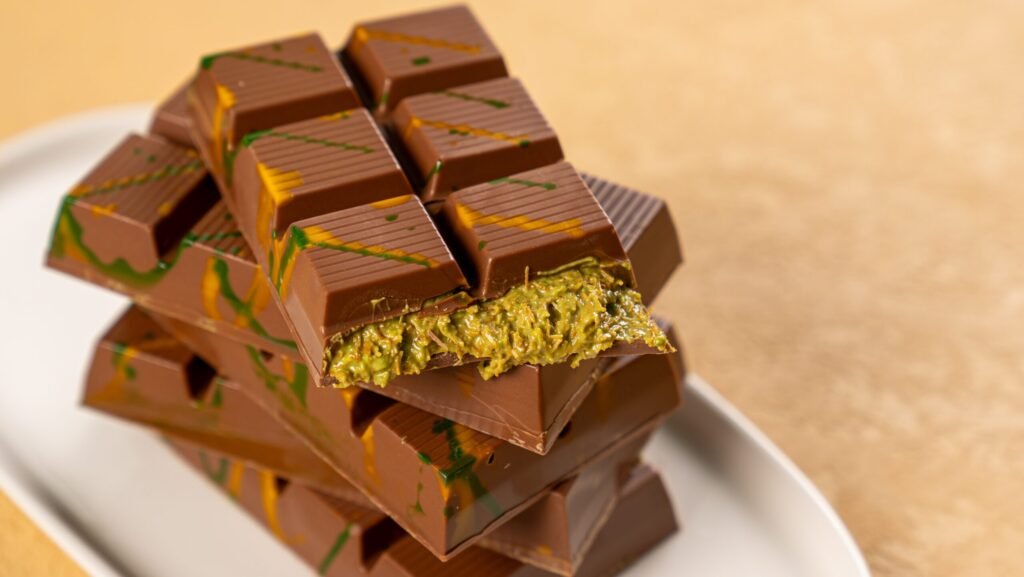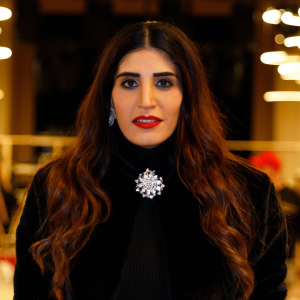Dubai Chocolate has become a global sensation, captivating dessert lovers with its unique blend of traditional Middle Eastern flavors and modern confectionery techniques. Among its most celebrated creations is the Dubai kunafa chocolate bar, which combines creamy pistachio filling, crispy kataifi pastry, and smooth chocolate for an unforgettable taste experience. However, the success of this chocolate bar has led to a concerning trend: counterfeit versions appearing in Europe, threatening authenticity, consumer trust, and the reputation of the original creators.
This wave of imitation products has sparked discussions not only about taste but also about cultural preservation, ethics, and protecting culinary innovation. For the chocolatiers behind this creation, maintaining authenticity is just as important as perfecting flavor.
The Rise of the Dessert
The Dubai kunafa chocolate bar represents more than a sweet treat; it is a symbol of culinary creativity. Crafted in Dubai, it fuses traditional Middle Eastern recipes with contemporary chocolate-making techniques. The bar transforms the iconic dessert, kunafa, into a convenient and luxurious chocolate experience.

Kunafa, celebrated for its delicate pastry, creamy filling, and fragrant syrup, is a staple of Middle Eastern cuisine. The chocolate bar translates these elements into layers of kataifi pastry, pistachio cream, and milk chocolate, providing a balanced combination of texture and flavor. This fusion maintains the essence of the original dessert while offering a modern twist that appeals to global audiences.
Social media has played a key role in the popularity of this creation. Posts and videos showcasing the dessert went viral, attracting attention from food enthusiasts worldwide. This attention has helped position the chocolate bar as a premium, culturally rich product.

Counterfeit Versions in Europe
As the Dubai creation gained popularity, imitation products began circulating, particularly in European markets. These fakes are often marketed as “Dubai-style chocolate” or claim to be authentic without following the original recipe.
These counterfeit bars use cheaper ingredients, like low-quality nuts or generic chocolate, and often skip critical preparation steps. Although they may appear similar to the original, the flavor and texture fall short of the genuine experience. By exploiting the chocolate bar’s reputation, these fakes mislead consumers and capitalize on the dessert’s growing fame.
The spread of these imitation products is concerning. They undermine the market for authentic chocolate bars, mislead consumers, and diminish the cultural significance behind the original creation. For the Dubai chocolatiers, counterfeiting represents more than a financial loss; it is an attack on heritage, creativity, and brand integrity.
The Importance of Authenticity
Authenticity is central to this creation. It reflects not only the quality of ingredients but also the craftsmanship and cultural identity of Dubai’s culinary scene. Every layer, from the pistachio cream to the kataifi pastry, is carefully crafted to honor tradition while innovating for a modern audience.
Counterfeit products compromise this authenticity, offering a lower-quality experience that distorts the story behind the chocolate bar. While cheaper imitations may tempt buyers, they fail to convey the nuances that make the original so special.
Chocolatiers emphasize that authenticity encompasses both taste and origin. Genuine bars are produced in Dubai, using premium ingredients and a meticulous process that ensures every bite reflects the original vision. Imitations lack this attention to detail, resulting in a subpar dessert that cannot match the original’s excellence.
Protecting the Chocolate
Safeguarding this creation against counterfeiting is challenging. Unlike technology or industrial products, culinary recipes are difficult to protect legally. Many traditional desserts exist in multiple forms worldwide, making enforcement complicated.
Despite these challenges, the creators have taken measures to protect their work. Legal actions, international trademarks, and clear branding strategies help distinguish authentic bars from fakes. Educating consumers on how to identify the genuine product is equally important in maintaining market integrity.
How to Spot Genuine Bars
Consumers can play a role in supporting authenticity by learning to recognize genuine chocolate bars. Here are some practical tips:
Purchase from authorized retailers: Buying directly from the official Dubai chocolatiers or approved sellers ensures authenticity.
Examine packaging: Authentic bars have high-quality packaging with clear branding, logos, and product details.
Check ingredients: Genuine bars use premium pistachios, fresh kataifi pastry, and high-quality chocolate. Avoid generic or vague listings.
Verify origin: The chocolate bar is produced in Dubai. Be cautious of products claiming to be Dubai-style without confirming origin.
By following these steps, consumers can enjoy the authentic taste of the chocolate bar while supporting the original creators.
Cultural Significance
The chocolate bar is more than a dessert. It is a representation of Dubai’s culture and culinary creativity. The creators take pride in blending traditional flavors with modern chocolate craftsmanship, producing a dessert that is both authentic and innovative.
Counterfeit versions threaten this cultural significance. They misrepresent the dessert and dilute the pride associated with Dubai’s culinary achievements. Preserving authenticity ensures that consumers experience not only great taste but also the cultural story behind it.

Economic Implications of Counterfeit Dubai Chocolate
Counterfeit products have tangible economic consequences. Original creators invest heavily in product development, ingredient sourcing, and branding. When fakes flood the market, profits are diverted, impacting the ability to innovate or expand.
Moreover, counterfeits can harm brand reputation. A consumer who purchases a fake Dubai Chocolate bar and experiences poor taste may wrongly attribute it to the original brand, causing long-term damage to trust. Maintaining authenticity is essential for preserving both revenue and reputation.
Social Media and Dubai Chocolate
Social media has been a double-edged sword for Dubai Chocolate. On one hand, it helped popularize the product worldwide, turning it into a viral sensation. On the other, counterfeit products have used social media to market themselves, capitalizing on the original bar’s success.
To combat this, Dubai chocolatiers have actively engaged on social media, showcasing the authentic bars, sharing behind-the-scenes content, and educating consumers. This approach not only strengthens brand recognition but also builds trust and awareness around authenticity.
Consumer Trends and the Global Appeal
The global market increasingly favors products that combine tradition with innovation. Dubai Chocolate, particularly the kunafa bar, exemplifies this trend, offering a unique experience that blends cultural heritage with contemporary flavors.
As international interest grows, it becomes even more critical to protect authenticity. Consumers are willing to pay a premium for genuine Dubai Chocolate, recognizing the craftsmanship, quality, and story behind each bar. Educating buyers about authenticity ensures the original creators receive proper recognition and support.
Safeguarding the Future of Dubai Chocolate
Despite the challenges posed by counterfeit products, Dubai Chocolate continues to thrive. Its popularity demonstrates the global appetite for innovative desserts rooted in cultural tradition.
Creators are continually refining recipes, enhancing packaging, and engaging with consumers to highlight what makes authentic Dubai Chocolate special. Protecting the brand ensures that the original bars can be enjoyed worldwide while preserving their cultural and culinary integrity.
Dubai Chocolate is more than a dessert. It symbolizes the city’s creativity, heritage, and commitment to quality. By safeguarding it, both creators and consumers contribute to preserving a legacy of culinary excellence for future generations.
Conclusion
The rise of counterfeit Dubai Chocolate in Europe highlights the delicate balance between global success and the challenges of imitation. While imitation may be flattering, it threatens authenticity, quality, and the hard work of Dubai’s chocolatiers.
Consumers have a role to play by choosing authentic products, learning how to spot fakes, and appreciating the craftsmanship behind every bar. Dubai Chocolate represents more than flavor. It is a cultural statement, a creative achievement, and a symbol of innovation.
By supporting authenticity, consumers and creators ensure that Dubai Chocolate continues to delight taste buds worldwide while preserving its rich culinary heritage. The Dubai Chocolate story proves that when tradition meets innovation, desserts can transcend borders, but only if originality is protected and celebrated.
Do follow UAE Stories on Instagram
Read Next – Abu Dhabi Traffic Discount: What You Need to Know












